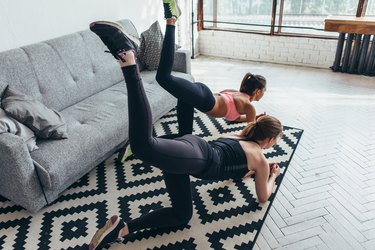
Leg kickbacks mimic movements you may make every day. Standing on one foot and extending one leg behind you is the same movement as a kickback. This puts your hip into extension — the opposite of flexion, when you kick your leg out in front of you. Extension is one of the primary movements your glutes — especially the gluteus maximus — are responsible for according to the American Council on Exercise.
Whether you want a better-looking butt or you want to get your glute muscles firing properly for running, cross-country skiing or any other sports where proper hip extension is crucial, kickback exercises are an excellent training tool.
Video of the Day
Video of the Day
Read more: The Top 15 Moves to Tone Your Glutes
Choose Your Kickbacks
You can choose from a few versions of kickbacks, depending on your training goals, fitness level and available equipment. They fall into two categories: kneeling (often called donkey kicks) and standing-cable kickbacks.
Kneel for This Kickback
These entry-level kickback exercises are also effective for athletes working on getting their glutes to fire properly. You don't need weights to do kneeling kickbacks, but you can add light weight with an exercise cable if desired.
How to do it:
- Get down on all fours on an exercise mat. Align your wrists under your shoulders and your knees under your hips.
- Contract your core muscles and ensure your spine is straight.
- Without changing the angle of your knee, extend your right leg back and up until your thigh is parallel with the ground. Kick like a horse, says Shape Fit. The sole of your right foot should be facing the ceiling.
- Contract your glute muscle at the top of the movement and hold for a count of one.
- Return to your starting position without touching your knee to the ground and repeat.
- Do 12 to 20 repetitions, then switch sides.
To add resistance, use a resistance band of the appropriate strength. Wrap the middle of the band around one foot and place the handles underneath your palms. Extend the banded leg out behind you, but change the angle of the knee to 45 degrees to keep the band from slipping.
Read more: The Advantages of Strong Glutes
Stand for the Cable Kickback
When you're ready to add more weight, use a cable machine with a low pulley. The cable kickback targets all three of the main glute muscles: maximus, medius and minimus, says AMM Fitness. While adding weight will aid hypertrophy, or muscle growth, it can also compromise form and put pressure on the low back. Be sure to keep your core contracted and slowly progress with the weight.
How to do it:
- Stand facing a cable machine with your ankle secured in a strap connected to a low pulley.
- Hold on to the pole or bar directly in front of you for support, and step back far enough that the cable connecting your ankle to the machine is taught.
- Stand up tall and contract your core muscles. With a slight bend in your knee, slowly extend your leg behind you as high as you can go without bending forward.
- Contract your glute and hold for one second at the top of the movement, then return to the starting position with control.
- Do eight to 15 repetitions, then switch sides.